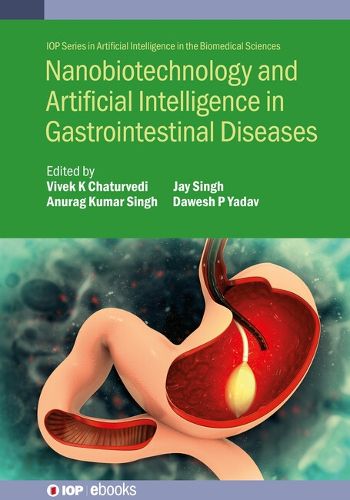Readings Newsletter
Become a Readings Member to make your shopping experience even easier.
Sign in or sign up for free!
You’re not far away from qualifying for FREE standard shipping within Australia
You’ve qualified for FREE standard shipping within Australia
The cart is loading…






This title is printed to order. This book may have been self-published. If so, we cannot guarantee the quality of the content. In the main most books will have gone through the editing process however some may not. We therefore suggest that you be aware of this before ordering this book. If in doubt check either the author or publisher’s details as we are unable to accept any returns unless they are faulty. Please contact us if you have any questions.
This book is broadly focused on recent developments in nanotechnology and artificial intelligence-based drug delivery systems, diagnosis, and the role of various nanomaterials in the management of gastrointestinal diseases, such as abdominal pain, bowel obstruction, diarrhoea, pancreatitis, celiac disease, intestinal tuberculosis and stomach cancer. It's hoped that this work will provide a comprehensive resource for clinicians, scientists, and researchers in a variety of fields such as gastroenterology, biotechnology, nanotechnology, pharmaceutical biotechnology, pharmacology, pharmaceuticals, nanomedicine, tissue engineering and biomaterials.
Key Features:
Book will explain how the most recent advances in applications of novel biomaterials, nanotechnology and artificial intelligence have paved the way for new breakthroughs in drug delivery related to gastrointestinal diseases.
It will cover in detail how AI and nanotechnology are working together to solve real-world clinical issues in gastroenterology.
Covers how nanotechnology is enhancing the specificity of detection and reducing the toxicity of drugs in the diagnosis and treatment of GI diseases.
Explores the emerging technology of AI in endoscopic analysis of inflammatory lesions and stomach cancer.
Explains how AI based nanomedicine can control molecules to make devices with pre-programmed functionality for more accurate drug delivery.
$9.00 standard shipping within Australia
FREE standard shipping within Australia for orders over $100.00
Express & International shipping calculated at checkout
This title is printed to order. This book may have been self-published. If so, we cannot guarantee the quality of the content. In the main most books will have gone through the editing process however some may not. We therefore suggest that you be aware of this before ordering this book. If in doubt check either the author or publisher’s details as we are unable to accept any returns unless they are faulty. Please contact us if you have any questions.
This book is broadly focused on recent developments in nanotechnology and artificial intelligence-based drug delivery systems, diagnosis, and the role of various nanomaterials in the management of gastrointestinal diseases, such as abdominal pain, bowel obstruction, diarrhoea, pancreatitis, celiac disease, intestinal tuberculosis and stomach cancer. It's hoped that this work will provide a comprehensive resource for clinicians, scientists, and researchers in a variety of fields such as gastroenterology, biotechnology, nanotechnology, pharmaceutical biotechnology, pharmacology, pharmaceuticals, nanomedicine, tissue engineering and biomaterials.
Key Features:
Book will explain how the most recent advances in applications of novel biomaterials, nanotechnology and artificial intelligence have paved the way for new breakthroughs in drug delivery related to gastrointestinal diseases.
It will cover in detail how AI and nanotechnology are working together to solve real-world clinical issues in gastroenterology.
Covers how nanotechnology is enhancing the specificity of detection and reducing the toxicity of drugs in the diagnosis and treatment of GI diseases.
Explores the emerging technology of AI in endoscopic analysis of inflammatory lesions and stomach cancer.
Explains how AI based nanomedicine can control molecules to make devices with pre-programmed functionality for more accurate drug delivery.